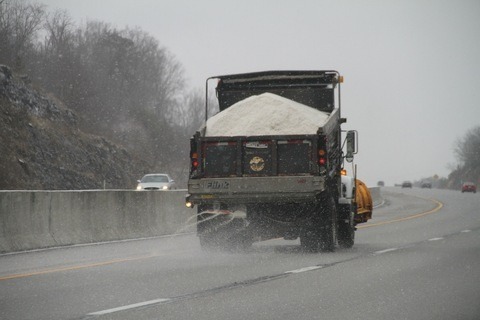It’s a crazy time of the year – it can be snowy one day and warm just a few days later. Cities love using road salt to treat icy and snowy roads. Road salt causes ice to melt and prevents refreezing. It is a relatively inexpensive solution to dangerous, icy roads.
But once the snow melts, residue from the salts often remain on the road and in puddles and moisture. If you plan on biking in the winter months, this salt and moisture is unavoidable. There are some steps you can take to prevent damage to your bike.
Preparation is key! Take the time to buy a few products to keep on hand and you will be able to prevent any corrosion or damage that the salts can do.
When road salts come in contact with precipitation, they release free-radical ions. When you ride and there is still salt on the roads and in puddles, you will get salt residue and these free-radical ions on your bike. In the short term, these salts won’t do much more than create a hazy appearance to the paint and chrome on your bike. But if you don’t clean off those salts, over time and with exposure to oxygen, iron oxide forms which can destroy metal.
Your motorcycle is full of nooks and crannies and little crevices that allow roads salts to enter. This salt water can lead to corrosion and, over time, can destroy the finish on your bike. Enough exposure can even lead to degradation of the parts themselves.
How Can You Prevent Motorcycle Damage from Winter Road Salt?
1. If you ride your motorcycle in the winter in an area that receives snow and ice, wash your motorcycle regularly.
2. When riding, avoid puddles as much as possible. Puddles collect runoff and salts, and will splash your bike with a mess of chemicals.
3. In order to avoid corrosion, you should repair any nicks or scratches in your paint. These exposed areas are quick to corrode, and also more difficult to wipe clean after you ride.
4. Use a salt neutralizer like Eastwood Rock Salt Neutralizer. These products contain a blend of corrosion inhibitors to neutralize salt and chemicals on the roadways so that they can’t harm your bike’s finish. A less expensive method is to combine baking soda, water, and some bike wash and use this mixture to wash down your motorcycle.
For a free legal consultation,
call 1-800-668-6729
Roadways tend to deteriorate after heavy snows. The freezing and refreezing of ice on the roads and the damage caused by road plows can leave behind potholes and divots in the pavement. If you ride in the winter months or even in the early spring, be aware that the roads can be especially dangerous. Loose pavement and fresh potholes can be treacherous for bikers, so be sure to actively scan the road when you ride.
At Kass & Moses, we strive to keep you abreast of the latest in motorcycle safety. We believe it is good help others avoid damage and disaster. Whether damage to your bike or your body, we want to keep you safe.
A final note: most of us know that winter weather conditions can lead to potholes. Small potholes and deteriorated areas of asphalt can be hazardous for bikers. Be sure to exercise extra caution and be aware of any damaged road surfaces.
We see the results of motorcycle crashes far too many times. Ride safe, no matter what the road conditions or weather, and if you are involved in a crash, call the team at 1-800-MOTORCYCLE. We will fight for you!
Call or text 1-800-668-6729 or complete a Free Case Evaluation form


